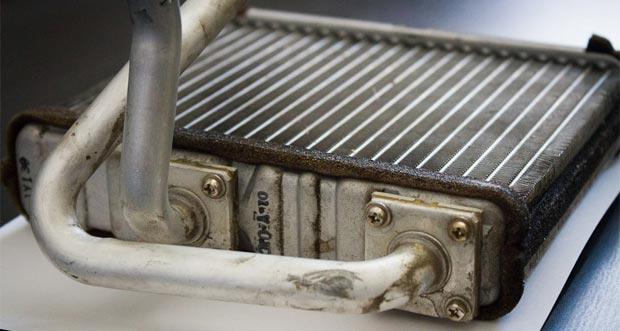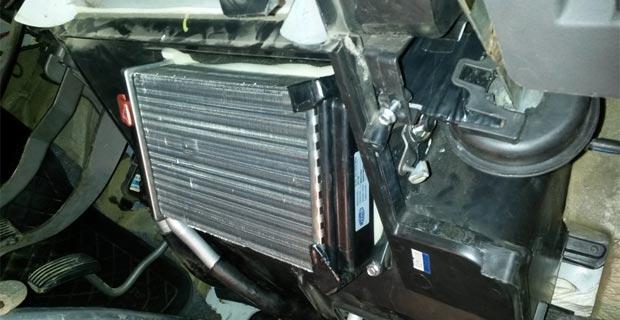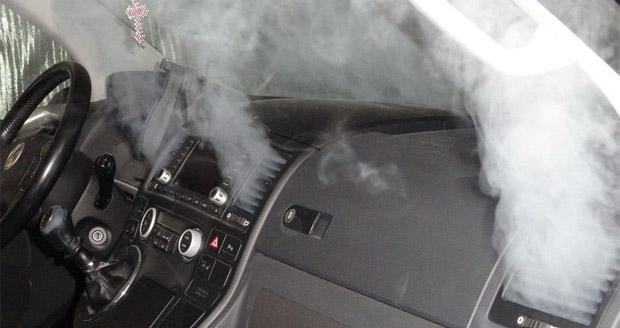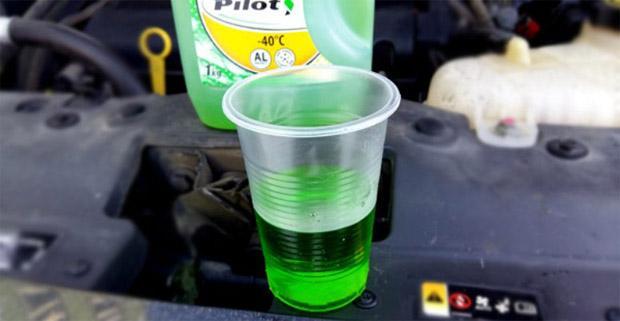
The smell of antifreeze in the cabin. Causes and remedies
Causes of the smell of antifreeze in the cabin
The sweetish smell of antifreeze in the cabin, especially noticeable after turning on the heater, always says one thing: there is a coolant leak in the system. There are four main ways that antifreeze vapors enter the cabin.
- Through a leaky heater core. This is the most common reason. If the smell is pronounced, accompanied by smudges of antifreeze into the passenger compartment or systemic fogging of car windows from the inside, then most likely the stove radiator has leaked. For example, on VAZ 2114 cars (and all models of the 10th series), as well as in the first generation Kalina, the stove radiator is made of two plastic tanks articulated with aluminum honeycombs with fins. Leaks usually occur at the junction of plastic and metal. On more "fresh" VAZ cars, such as Grant, Priora and Kalina-2, the heater radiator is all-aluminum. In it, honeycombs are usually destroyed or the inlet pipes are broken.


- Damage to the radiator inlet or outlet pipes at their base. In this case, only the smell in the cabin is usually observed. There are no fogging of glasses or smudges, or these factors are not pronounced. Depressurization of the system for this reason usually occurs at the joints. Less often, the pipes themselves are damaged.
- Insufficient tightening of the clamps on the pipes of the stove radiator. Antifreeze seeps into this joint quite often. The most repairable malfunction. Eliminated by tightening the clamps.
- Violation of the integrity of the cooling system in any place other than the heater. In this case, only a slight smell of antifreeze in the cabin is possible. Also, the entire engine compartment will smell like antifreeze. The problem is usually accompanied by a sharp and noticeable drop in the coolant level in the expansion tank and overheating of the car.


There are several reasons for the destruction of pipes, radiators (central and heater), as well as other elements of the cooling system:
- low quality antifreeze;
- intermittent use of water instead of a suitable coolant;
- untimely replacement of the coolant;
- cavitation destruction;
- excessive pressure in the system due to problems with the steam valve;
- overheating with liquid boiling;
- natural wear and tear.
At the first appearance of the smell of antifreeze in the passenger compartment, it is necessary to check the tightness of the system. Please note: some antifreezes are specially added with special fluorescent components that glow under ultraviolet radiation. This helps to find even a small leak.


Possible consequences and solutions
The problem of leaking antifreeze has several negative consequences.
- Technical. A leak will sooner or later lead to a critical drop in the level of antifreeze and overheating of the engine. The coolant in the cabin will cause accelerated oxidation of the on-board electronics contacts, since antifreezes are partly water. And with a heavy coolant leak, this problem can even cause a short circuit in the wiring.
- Operational. Systematic fogging of windows due to condensation of antifreeze leaving the system will permanently reduce visibility. The risk of getting into an accident will increase. Excessive humidity in the cabin will lead to the appearance of fungus and mold. And this is an additional source of unpleasant odor.


- Physiological. Ethylene glycol, the main component of the vast majority of modern coolants, is toxic to humans. The lethal dose ranges from 100 to 300 grams. In a volatile form, when it enters through the respiratory system, its concentration in the body rarely reaches a dangerous level. However, with the systematic inhalation of vapors, dizziness, nausea, coughing and irritation of the mucous membranes are possible. In addition, the smell of antifreeze is not pleasant for everyone and can become an additional irritating factor.
The best solution in this situation is a repair with the replacement of damaged elements of the cooling system. As a temporary measure, it is possible to use a repair sealant for the radiator.


Watch this video on YouTube

